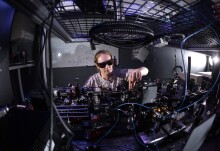

Membrane protein crystallography expert kicks off Nobel Conversations series<em> - News</em>
By Danielle Reeves
10 April 2008
Imperial's Nobel Conversations series kicked off this week with a lively and engaging discussion with Professor Hartmut Michel from the Max Planck Institute of Biophysics, who won the Nobel Prize for Chemistry in 1988 for being the first person to grow crystals from membrane proteins.
Professor Michel, who is also a visiting Professor in Imperial's Department of Life Sciences, began the event on Monday 7 April by outlining the different reasons scientists are awarded Nobel prizes. He cited serendipitous discoveries, developing new methods to solve scientific or medical problems, and breakthroughs which were previously considered impossible, as the principal grounds for Nobel prizes being awarded to scientists. The latter of these three reasons applies to the prize he shared with two others in 1988.
Describing his career in science, Professor Michel explained how, prior to his work, textbooks claimed that growing crystals from the proteins attached to cell membranes was impossible. Crystallising proteins is important because when a protein is in crystal form, the atomic structure of the protein can be determined, which is vital for understanding how many different cell functions work.
The outcome of Prof Michel's work has included a full understanding of how photosynthesis works
Professor Michel highlighted the importance of membrane proteins in the life of a cell, describing how they carry out diverse roles including transporting substances and information across the cell, acting as receptors and sensors, and aiding key cellular processes such as photosynthesis and cell respiration.
In the mid-1980s when he first presented evidence that he was able to grow crystals from membrane proteins, and to photograph them using x-ray crystallography techniques, Professor Michel received a standing ovation at a meeting of crystallographers. He told the audience at Imperial that within 18 months of this meeting he had been awarded the Nobel prize at the young age of 40. However he cautioned that winning the highest accolade in science at such a young age is not all it is cracked up to be: "Suddenly everybody thinks you know everything!" he said.
The second part of the Nobel Conversation event involved an informal question-and-answer session led by fellow Nobel laureate and Imperial visiting professor, Stanley Prusiner.
Professor Prusiner asked Professor Michel about his early interest in science, and what motivated him. Citing the age of 10 or 12 as the age he first took an interest in science, Professor Michel said: "Before that I was an outside boy, playing in the fields, but I got interested in trying to understand things. I read very many books."
However, it was a physics teacher in high school that really inspired Professor Michel to consider a career in science: "Physics teaching at my school was excellent,â he said. "I decided I wanted to go into biochemistry however, as I thought it would be a more rewarding field than physics."
Taking questions from the audience, Professor Michel was asked what it was that made him decide to start working on growing crystals from membrane proteins. "My driving force was wanting to show that something considered impossible was, in fact, possible," he said.
Summing up at the end of the event, Professor Michel stressed the importance of individual scientists striving to make the breakthroughs that will chance the face of science in coming years: "It's the individuals, single scientists, that make the difference," he said, "Not the big research consortia."
The Nobel Conversations series brings winners of Nobel prizes in the sciences to Imperial College London to discuss their major discoveries. The emphasis of these conversations is on discovering the unexpected in science. After a brief presentation of the science, each Nobel laureate will be asked questions including why they became a scientist and what influenced their particular research path. Afterwards, the laureate will take questions from the audience.
-Ends-
Article text (excluding photos or graphics) available under an Attribution-NonCommercial-ShareAlike Creative Commons license.
Photos and graphics subject to third party copyright used with permission or © Imperial College London.





